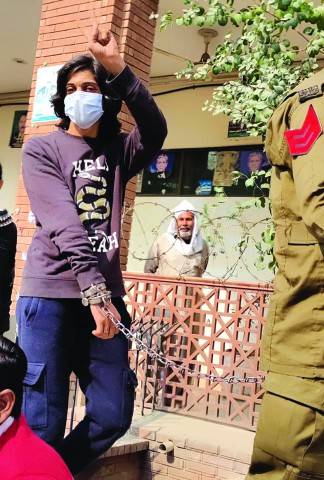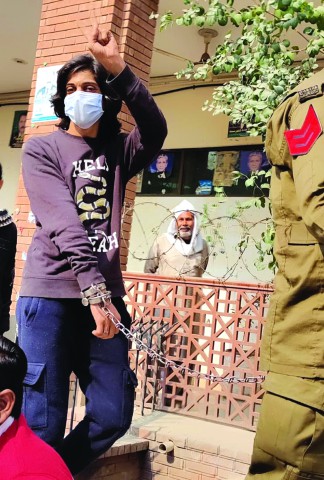
At 4am last Thursday we were woken by the sound of policemen breaking into our home. They came to arrest us – five students – in a manner usually reserved for terrorists. We were grabbed by the collars, blindfolded, thrashed, and taken to an unknown location. Throughout it all, we were mostly struck by how much we seemed to frighten them.
The walls of the cell where we were kept was filled with countless lines scratched in by the many occupants who had been here before us. One could even spot one or two expressionist drawings made by some old detainee. The only things audible were the cries of other detainees, or the mundane everyday gossips of policemen. Between these mundane gossips and cries for help, it did not matter anymore if we were ‘more sinned against than sinning.’ The only thing that made sense was Hamlet’s famous soliloquy: to be or not to be, that is the question.
We wondered why our state was so afraid of students. Why we were being treated like terrorists? It was a sickening feeling: coming to terms with the realization that convicted terrorists roam freely in this country while students are locked up in a dungeon. We felt abandoned and betrayed by the government which had promised us a better future. As a matter of fact, we realized that though the political existence of students has dismissed for a long time, the situation has only deteriorated under the current regime.

Students are being targeted because there is a burgeoning movement across the country. They are being attacked because they are reclaiming their political agency which was taken away from them 35 years ago with the ban on student unions. Today’s student movement is an expression of the anger against years of silencing. It is an expression of disgust against the system which has robbed students of their political agency but has given private education mafia a free hand to exploit them as much as it can. It is an expression of hatred against their own commodified selves. It is a rejection of this education system in which extraction of profits during a global pandemic is considered a right, but protesting it is seen as a crime. Most of all, this movement is an expression of a deep desire for change in this rotten political system.
The current student movement has emerged organically but it is better organized than ever before. Because this movement does enjoy patronage from any powerful quarters, it is perceived with suspicion and its leaders are treated like terrorists. Fascism is always afraid of the minutest expressions of democracy, or even the desire for democracy.
But repression is always a dangerous element. Students are demanding a platform to raise their concerns politically. Elected student unions are a necessity for students where they can exercise their political, democratic and constitutional rights. If this desire for political agency is repressed, it could give way to more turmoil.
India is a classic example of students’ political representation. Even though India is far from an ideal democracy, their students have the right to raise their voices through student unions. The question then is, who does not want student unions in Pakistan? Who benefits from the apolitical character of students? The answer is obvious: those whose profits are threatened when students speak against exploitation and oppression; those who can deploy private security as well as state machinery to protect their vested interests. These people believe that students must not be allowed to threaten the big business of education

But the question of political representation is a now a matter of existence for the students. They need platforms where they can raise their concerns democratically, where they can debate the need for online classes and exams and fee hikes in the midst of a global pandemic. By acting in collusion with the private education mafia in suppressing this desire of students, the state is only playing a destructive role.
Each time I think of that dark cell where we were kept, or the scenes of our handcuffed selves appear before my eyes, I only hope that someday things will change in this country. The day when the system, the police, the bureaucracy and every segment of state machinery will now longer be paralyzed by a few billionaires. I only hope that there will come a day when students get their voices back instead of being blindfolded and thrown into police vehicles like terrorists. I only think of Faiz’s famous verse; ‘lambi hai gham ki shaam, magar shaam hi to hai’ (The night of grief is long, yet it is just night).
The writer is a student activist organizing with the Progressive Students Collective
The walls of the cell where we were kept was filled with countless lines scratched in by the many occupants who had been here before us. One could even spot one or two expressionist drawings made by some old detainee. The only things audible were the cries of other detainees, or the mundane everyday gossips of policemen. Between these mundane gossips and cries for help, it did not matter anymore if we were ‘more sinned against than sinning.’ The only thing that made sense was Hamlet’s famous soliloquy: to be or not to be, that is the question.
We wondered why our state was so afraid of students. Why we were being treated like terrorists? It was a sickening feeling: coming to terms with the realization that convicted terrorists roam freely in this country while students are locked up in a dungeon. We felt abandoned and betrayed by the government which had promised us a better future. As a matter of fact, we realized that though the political existence of students has dismissed for a long time, the situation has only deteriorated under the current regime.

Students are being targeted because there is a burgeoning movement across the country. They are being attacked because they are reclaiming their political agency which was taken away from them 35 years ago with the ban on student unions. Today’s student movement is an expression of the anger against years of silencing. It is an expression of disgust against the system which has robbed students of their political agency but has given private education mafia a free hand to exploit them as much as it can. It is an expression of hatred against their own commodified selves. It is a rejection of this education system in which extraction of profits during a global pandemic is considered a right, but protesting it is seen as a crime. Most of all, this movement is an expression of a deep desire for change in this rotten political system.
The current student movement has emerged organically but it is better organized than ever before. Because this movement does enjoy patronage from any powerful quarters, it is perceived with suspicion and its leaders are treated like terrorists. Fascism is always afraid of the minutest expressions of democracy, or even the desire for democracy.
By acting in collusion with the private education mafia in suppressing this desire of students, the state is only playing a destructive role
But repression is always a dangerous element. Students are demanding a platform to raise their concerns politically. Elected student unions are a necessity for students where they can exercise their political, democratic and constitutional rights. If this desire for political agency is repressed, it could give way to more turmoil.
India is a classic example of students’ political representation. Even though India is far from an ideal democracy, their students have the right to raise their voices through student unions. The question then is, who does not want student unions in Pakistan? Who benefits from the apolitical character of students? The answer is obvious: those whose profits are threatened when students speak against exploitation and oppression; those who can deploy private security as well as state machinery to protect their vested interests. These people believe that students must not be allowed to threaten the big business of education

But the question of political representation is a now a matter of existence for the students. They need platforms where they can raise their concerns democratically, where they can debate the need for online classes and exams and fee hikes in the midst of a global pandemic. By acting in collusion with the private education mafia in suppressing this desire of students, the state is only playing a destructive role.
Each time I think of that dark cell where we were kept, or the scenes of our handcuffed selves appear before my eyes, I only hope that someday things will change in this country. The day when the system, the police, the bureaucracy and every segment of state machinery will now longer be paralyzed by a few billionaires. I only hope that there will come a day when students get their voices back instead of being blindfolded and thrown into police vehicles like terrorists. I only think of Faiz’s famous verse; ‘lambi hai gham ki shaam, magar shaam hi to hai’ (The night of grief is long, yet it is just night).
The writer is a student activist organizing with the Progressive Students Collective

